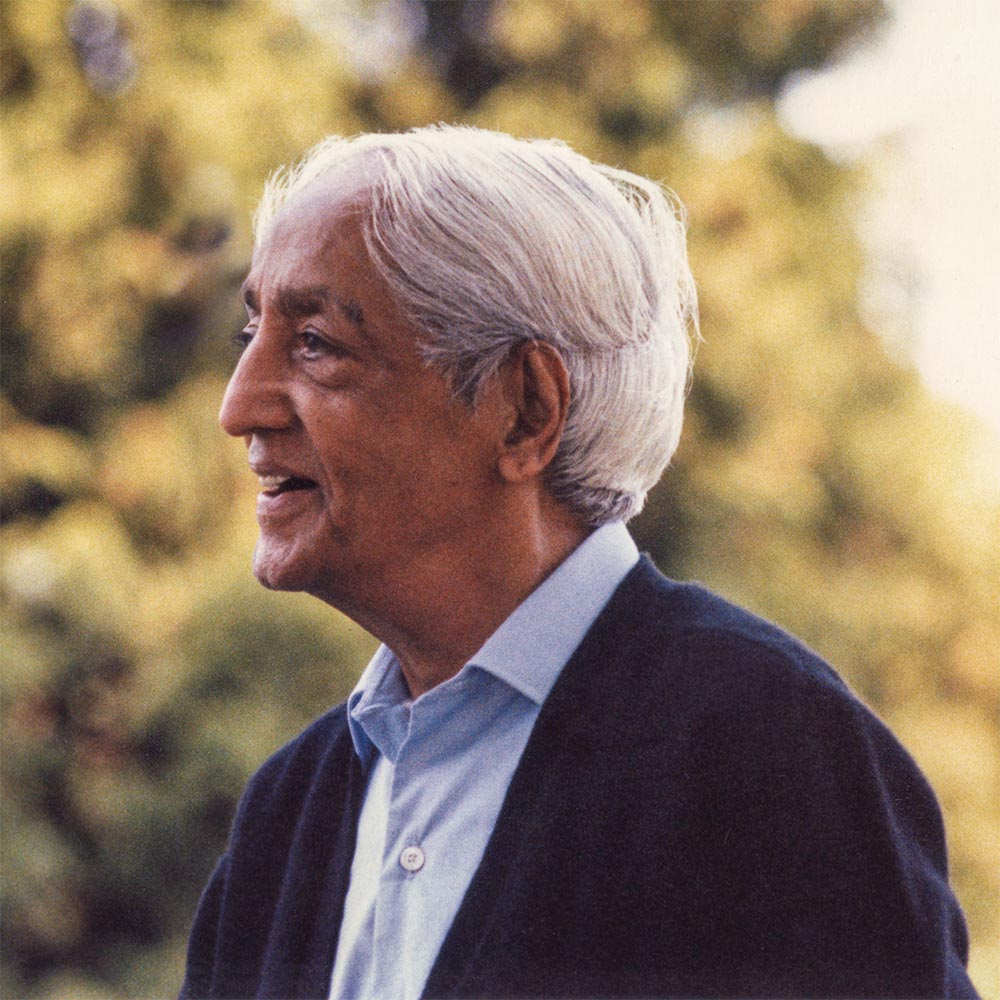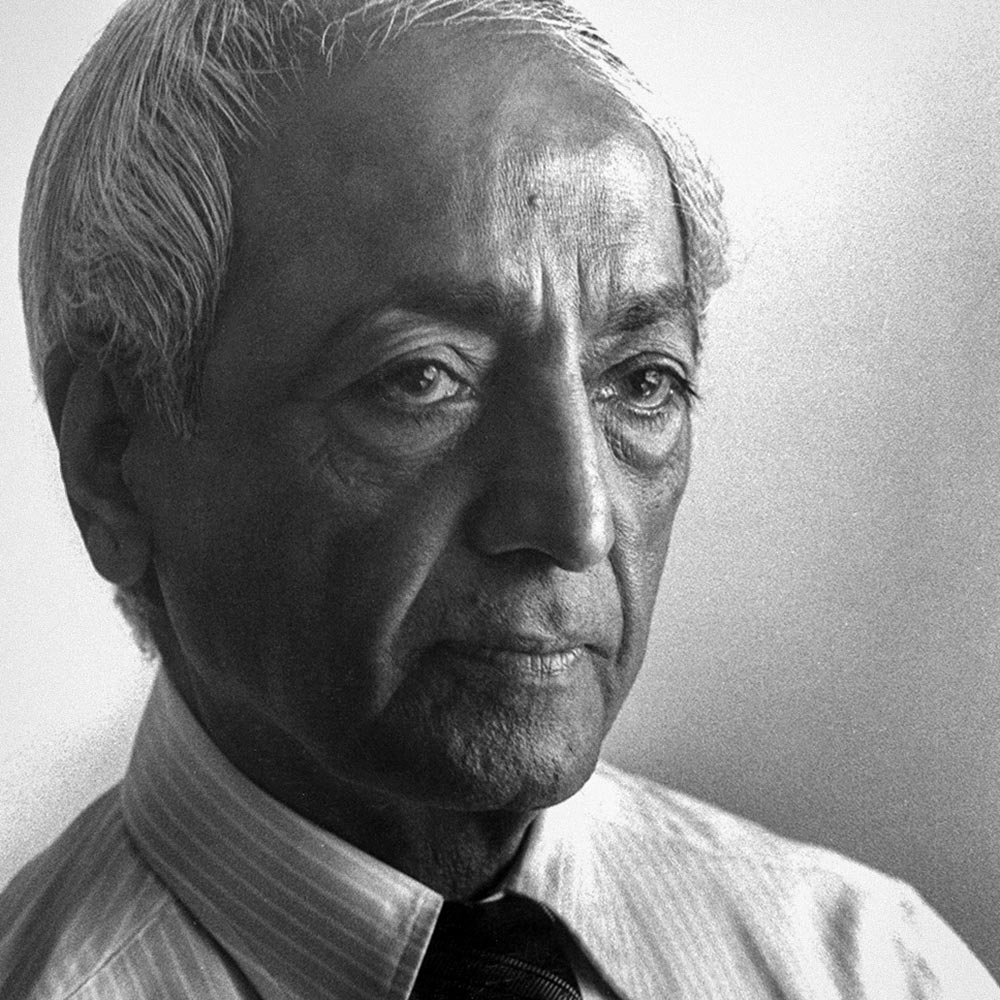Only the immature mind compares. The mature mind has no comparison, the mature mind has no measure.
Krishnamurti, The Awakening of Intelligence
Read More
Time or age is not an indication of maturity.
Krishnamurti, The Awakening of Intelligence
Read More
Q: No.
K: So we can remove that. Time or age is not an indication of maturity. Then there is the maturity of the very learned man, the man who is highly, intellectually capable.
Q: No, he may twist and turn the words.
K: So, we will eliminate that. Whom would you consider a mature, ripe person?
Q: The one who is able to observe.
K: Wait. Obviously, the one who goes to churches, temples or mosques is out; so is the intellectual, the religious and the emotional. We should say, if we eliminate all that, maturity consists in being not self-centred – not me first and everybody else second, or my emotions first. So maturity implies the absence of the ‘me’.
Maturity implies a total, natural development of a human being – natural in the sense noncontradictory and harmonious, which has nothing to do with age.
Krishnamurti, The Impossible Question
Read More
In total maturity is austerity.
Read More
Maturity is that state when all choice has ceased. It is only the immature that choose and know the conflict of choice.
Read More
Maturity of the mind is to be capable of observation, seeing the false as the false, the true in the false, and truth as truth. That is maturity, whether in the political scene, in the business world, or in your relationships.
Krishnamurti, This Light in Oneself
Read More
We are concerned with the fundamental revolution of the mind, of the whole structure of oneself, for the mind to free itself of all its conditioning so that we are not just educated and sophisticated, but real, mature, deep human beings.
Krishnamurti, The Impossible Question
Read More
Education in the true sense is helping the individual to be mature and free, to flower greatly in love and goodness.
Krishnamurti, Education and the Significance of Life
Read More
To break out of the prison of belief requires a mature mind.
Krishnamurti, Think on These Things
Read More
We grow to maturity without maturing inwardly, without knowing what we want to do, but being forced to do something in which our heart is not. So we live in misery.
Krishnamurti, Reflections on the Self
Read More
Why do so many of us, as we grow into so-called maturity, become dull, insensitive to joy, to beauty, to the open skies and the marvellous earth?
Krishnamurti, Think on These Things
Read More
Will you mature rapidly, or slowly, gracefully and sensitively? Will you be mediocre, though you may be first class in your profession?
Read More
If one doesn’t know how to meditate, one is not a mature human being.
Krishnamurti, Think on These Things
Read More
Maturity in meditation is the freeing of the mind from knowledge, for knowledge shapes and controls all experience.
Krishnamurti, Meditations
Read More
Suffering, when allowed to mature, finds its own release.
Krishnamurti, The World Within
Read More
These quotes only touch on the many subjects Krishnamurti inquired into during his lifetime. His timeless and universal teachings can be explored using the Index of Topics where you will find texts, audio and video related on many themes. Another option is to browse our selection of curated articles or more short quotes. Krishnamurti’s reply when asked what lies at the heart of his teachings can be found here. Many Krishnamurti books are available, a selection of which can be explored here. To find out more about Krishnamurti’s life, please see our introduction and the biography. We also host a weekly podcast, and offer free downloads. Please visit our YouTube channel for hundreds of specially selected shorter clips. Below, you can learn more about Krishnamurti and our charity which he founded in 1968.

Who Was Krishnamurti?
J. Krishnamurti (1895-1986) is widely regarded as one of the greatest thinkers and religious teachers of all time. He spoke throughout the world to large audiences and to individuals, including writers, scientists, philosophers and educators, about the need for a radical change in mankind. Referring to himself, Krishnamurti said:
He is acting as a mirror for you to look into. That mirror is not an authority. It has no authority, it’s just a mirror. And when you see it clearly, understand what you see in that mirror, then throw it away, break it up.
Krishnamurti was concerned with all humanity and held no nationality or belief and belonged to no particular group or culture. In the latter part of his life, along with continuing to give public talks, he travelled mainly between the schools he had founded in India, Britain and the United States, which educate for the total understanding of man and the art of living. He stressed that only this profound understanding can create a new generation that will live in peace.
Krishnamurti reminded his listeners again and again that we are all human beings first and not Hindus, Muslims or Christians, that we are like the rest of humanity and are not different from one another. He asked that we tread lightly on this earth without destroying ourselves or the environment. He communicated to his listeners a deep sense of respect for nature. His teachings transcend man-made belief systems, nationalistic sentiment and sectarianism. At the same time, they give new meaning and direction to mankind’s search for truth. His teaching is timeless, universal and increasingly relevant to the modern age.
I am nobody. It is as simple as that. I am nobody. But what is important is who you are, what you are.
Krishnamurti
Krishnamurti spoke not as a guru but as a friend. His talks and discussions are based not on tradition-based knowledge but on his own insights into the human mind and his vision of the sacred, so he always communicated a sense of freshness and directness, although the essence of his message remained unchanged over the years. When Krishnamurti addressed large audiences, people felt that he was talking to each of them personally, addressing their own particular problem. In his private interviews, he was a compassionate teacher, listening attentively to those who came to him in sorrow, and encouraging them to heal themselves through their own understanding. Religious scholars found that his words threw new light on traditional concepts. Krishnamurti took on the challenge of modern scientists and psychologists and went with them step by step, discussing their theories and sometimes enabling them to discern the limitations of their theories.
Krishnamurti left a large body of literature in the form of public talks, writings, discussions with teachers and students, scientists, psychologists and religious figures, conversations with individuals, television and radio interviews, and letters. Many of these have been published as books, in over 60 languages, along with hundreds of audio and video recordings.

The Krishnamurti Foundation
Established in 1968 as a registered charity, and located at The Krishnamurti Centre, Krishnamurti Foundation Trust exists to preserve and make available Krishnamurti’s teachings.
The Foundation serves a global audience by providing worldwide free access to Krishnamurti videos, audio and texts to those who may be interested in pursuing an understanding of Krishnamurti’s work in their own lives.
In describing his intentions for the Foundations, Krishnamurti said:
The Foundations will see to it that these teachings are kept whole, are not distorted, are not made corrupt.

